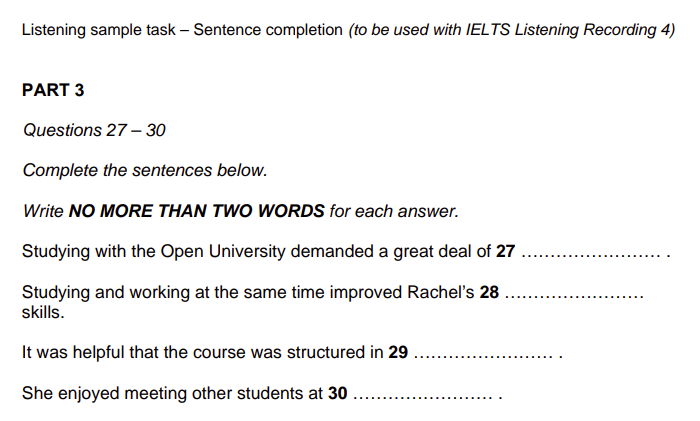Sentence completion questions are a common task type in the IELTS Listening test and can appear in Part 4. Let’s look at how you can approach this question type.
Like all other question types in the IELTS Listening test, answers to sentence completion tasks also appear in the same order as in the recording. However, remember that within the question, the sentence will be a paraphrase of what the speaker or speakers say.
How to answer Sentence Completion in IELTS Listening
During your preparation time before the recording begins, highlight the keywords in the sentences. Keywords can help you focus on the specific information you need to listen for.
Use these keywords to decide what part of speech is missing, such as a noun, verb, adjective, adverb, preposition, number, etc. Don’t forget that nouns can appear in plural form and verbs can be in past, past participle or present participle form. Some words may need prefixes as well (e.g. in- / un- / im- / etc.).
Look at the task below:
Listen to the following recording and think about your answer. Write no more than TWO words. 1. New employees struggle to form ____________with upper management. 2. This is especially difficult for ________________without formal university qualifications. |
What do you think the keywords are?
Looking at Question 1, you could highlight the following words:
New employees struggle to form _______________ with upper management.
The word ‘form’ is a verb, so you can guess that the answer is a noun. Remember though, that you are allowed two words in your answer, so an adjective + noun combination is possible, or even a compound noun.
As for Question 2, keywords to highlight can include:
This is especially difficult for____________without formal university qualifications.
Because of the words ‘difficult for’, you might predict that it could be for a particular type of person (i.e. difficult for someone). Again, you would expect a noun to be the correct answer here, but would it be in singular or plural form?
Look at the transcript below. Can you find examples of paraphrased words?
“First of all, for employees who have recently joined the company, it can be quite difficult to create close relationships with senior managers. While this is not totally unusual, it is particularly hard for non-academic staff …”
Answers
new employees = employees who have recently joined the company
struggle = it can be quite difficult to
form = create
upper management = senior staff
especially difficult = particularly hard
without formal university qualifications = non-academic
After looking at the transcript, what do you think are the answers to Question 1 and Question 2?
“First of all, for employees who have recently joined the company, it can be quite difficult to create close relationships with senior managers. While this is not totally unusual, it is particularly hard for non-academic staff …”
For Question 1, the answer is ‘close relationships’. You would need both words to be correct. The word ‘close’ is necessary as it provides a more accurate answer. E.g. it is quite difficult to create close relationships rather than distant ones.
For Question 2, the answer is ‘staff’. This is an irregular noun (1 staff, 2 staff, etc.), so there is no ‘s’ at the end of the word. Also, ‘non-academic staff’ would be incorrect. This is because ‘non-academic’ is already mentioned in the question (‘without formal qualifications’).
Note: ‘non-academic’ is considered as one word because it is hyphenated.
General tips for Sentence Completion IELTS Listening
When working through IELTS sentence completion questions, use your time wisely by following the checklist below:
Highlight the keywords
Anticipate the answer by working out what part of speech is missing.
Check your spelling
Don’t copy across unnecessary words.
IELTS sentence completion practice
Our IELTS Listening practice questions can help you develop the confidence and skills you need to perform your best on test day. Try the sample sentence completion task below and check your answers on our practice questions page.

Source: Free IELTS Listening – practice sample questions | IDP IELTS
Need more support with IELTS Listening? Prepare for success with our IELTS Preparation Hub.
IELTS Listening: FAQs
Finds answers to frequently asked questions on IELTS Listening.
